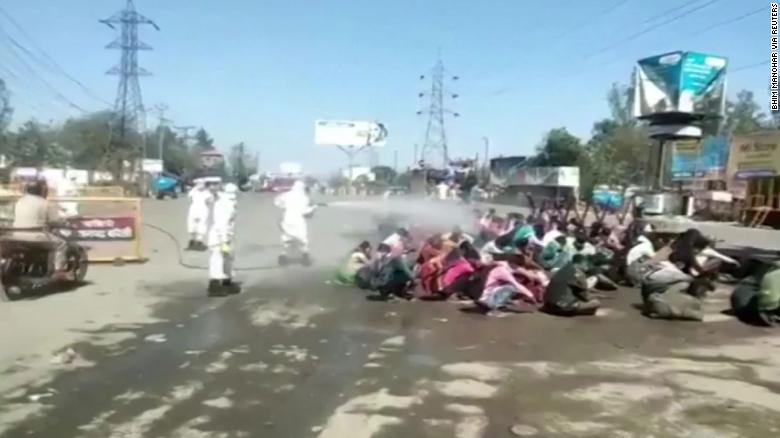Migrant Workers Sprayed With Disinfectant In One Indian State
New Delhi (CNN)The Indian state of Uttar Pradesh has sparked controversy after migrant workers, returning home during a nationwide coronavirus lockdown, were doused in bleach disinfectant used to sanitize buses.
Video showed three people, dressed in protective gear, spraying the liquid directly on a group of Indian workers as they sat on the ground in the northern city of Bareilly.
Ashok Gautam, a senior officer in charge of Covid-19 operations in Uttar Pradesh, told CNN as many as 5,000 people have been "publicly sprayed" when they arrived before they were allowed to disperse.
"We sprayed them here as part of the disinfection drive, we don't want them to be carriers for the virus and it could be hanging on their clothes, now all borders have been sealed so this won't happen again," he said.
He said the disinfectant used was a solution made from bleaching powder, and was not harmful to the human body.
While chemical disinfectants work on surfaces, they can be dangerous to people. And according to the World Health Organization (WHO), putting disinfectant on your skin will not kill it if the virus is already in your body.
Overzealous action'
The chemical wash has appalled many in India. Lav Agarwal, senior official at the Ministry of Health and Family Welfare, said Monday that local officials involved in the incident have been "reprimanded," adding that spraying migrant workers was not a "required" policy in the country.
"This is an overzealous action done by some employees at the field level, either out of ignorance or fear," he said.
The district magistrate of Bareilly, Nitish Kumar, also tweeted that while the municipal corporation and local fire service were under orders to sanitize buses, they were "overzealous" in spraying the migrant workers directly.
"Orders to launch an inquiry against those responsible have been given," he said.
Video showed the workers being doused in the chemical.
Kumar, who is the highest-ranking district official in the city, added that workers affected by the incident are currently under medical surveillance following instructions from the chief medical officer.
Tens of thousands of India's 45 million economic migrant workers have been making a long, arduous journeys back to their rural villages. Many of them had lost their jobs as businesses' shut their doors across India's cities due to the lockdown.
On Sunday, Prime Minister Narendra Modi urged all states to seal their borders to stop the virus being imported into rural areas. Officials are now scrambling to find millions of migrant workers who had already returned to small towns and villages across the country, in order to quarantine them for 14 days.


Yorumlar
Yorum Gönder